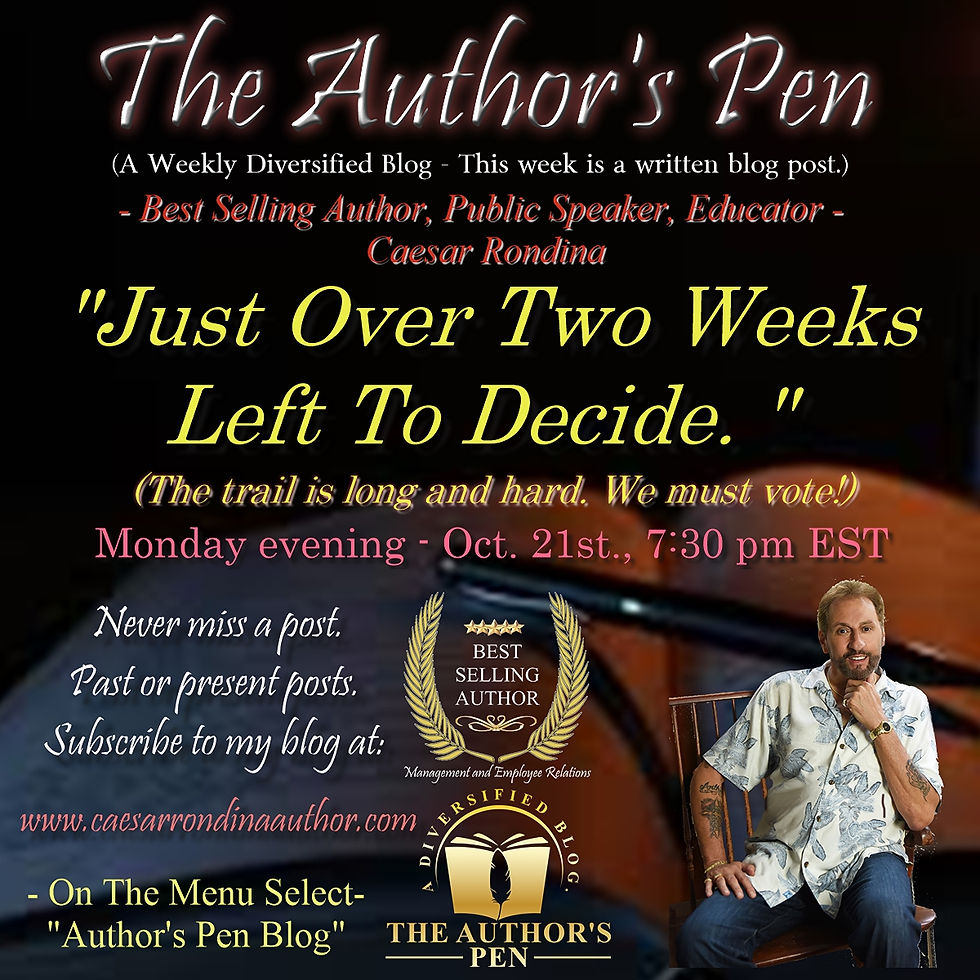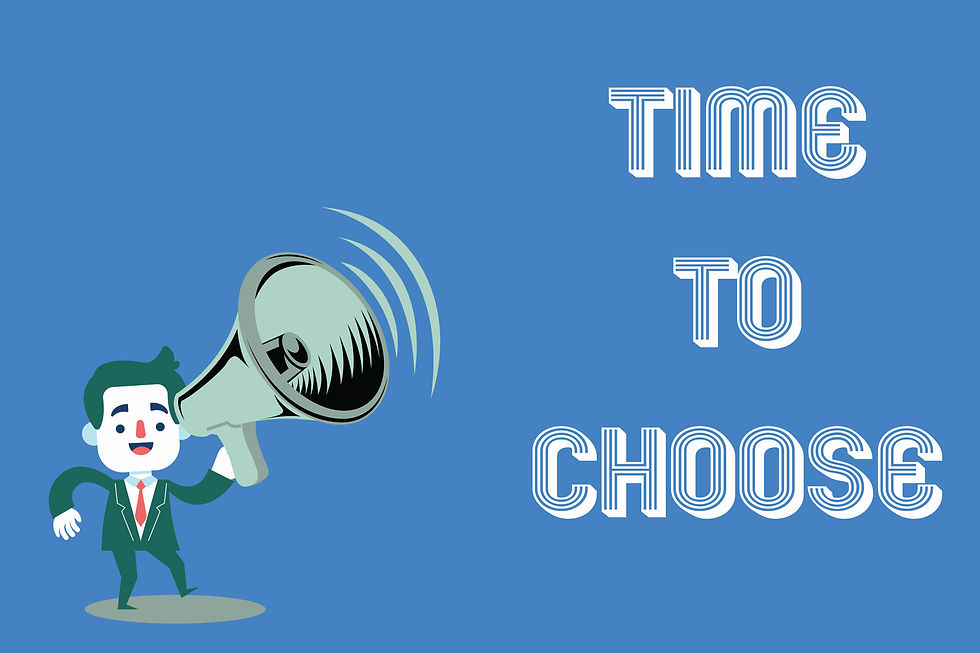Just Over Two Weeks Left To Decide - The trail is long and hard. We Must vote.

INTRODUCTION:
Greetings. As a reminder, over 90% of the topics I discuss are requested by my readers and subscribers. I have received many emails asking me to discuss why it is so hard for people to decide who to vote for. That is a challenging topic because no one is a mind reader. However, some things are known as human traits. Human traits apply to society in general. Not all people display the same human traits.
For many, voting is a private choice they will not share with others. It is often easier for someone to say they are undecided to avoid conflicts with others. Currently, it is estimated that 13% of people are undecided about who they will vote for. No one knows for sure how accurate that is. People can be undecided for several reasons. For example, they may like one candidate on some issues and not others. They need to decide what issues are most important to them.
Additionally, many people enter a voting booth intending to vote for one candidate and experience a last-minute change of heart. All of this falls under the umbrella of human traits. Let's look at this further.
HUMAN TRAITS AND CHOICES:
Making choices is an intrinsic part of the human experience, profoundly influencing our lives, relationships, and futures. No matter how small or monumental, each decision is underpinned by many human traits and cognitive biases that shape our preferences, desires, and actions. This article delves into the essential human traits that play a crucial role in decision-making, ranging from cognitive to emotional influences.
Humans have a natural tendency to approach choices with a degree of rationality. The logical framework involves assessing options based on pros and cons, evaluating potential outcomes, and weighing risks. Cognitive psychologists often describe this as 'normative decision-making,' where individuals aim to make choices that lead to the best overall outcome. While most people strive to make rational decisions, humans are not strictly logical. The phenomenon of bounded rationality emphasizes that cognitive constraints, information overload, and time pressures often limit our capacity to make optimal choices. As a result, we may fall back on past experiences or mental shortcuts, which can simplify the decision-making process but may lead to errors. This is known as cognitive bias.
Emotions play a pivotal role in the decision-making process. Research indicates that feelings can significantly influence our choices, sometimes overriding rational thought. For instance, fear of loss might deter a person from taking risks, while the anticipation of joy might encourage a bold choice. Regardless of their policies, some may not like a candidate's personality in an election. More on this later.
Intuition, often described as a gut feeling, is a form of subconscious reasoning influenced by emotions and past experiences. It occurs when individuals make quick, instinctual decisions based on patterns they have observed over time. While intuitive choices can sometimes be effective, they can also lead to biases and errors—often called "gut feeling bias." (Courtesy Wikipedia)
Humans are inherently social creatures, and societal norms and cultural contexts profoundly affect our decisions. Cultural backgrounds can dictate the options a person might consider acceptable or desirable. For instance, collectivist societies may prioritize group harmony and conformity over individual preferences, leading to different decision-making outcomes compared to more individualistic cultures. (Courtesy Google)
The influence of peers cannot be underestimated. (Peer pressure) Social identity and the desire for acceptance can sway our choices. Studies have shown that people are often inclined to align their decisions with those of their social circles, a phenomenon rooted in the human need for belonging and affirmation. Some refer to this as the difference between some people being leaders and others followers.
Personality traits significantly affect how individuals make choices. Conscientiousness, openness to experience, and emotional stability can shape decision-making styles. For example, a conscientious person may approach choices methodically, conducting thorough research and analysis, whereas someone high in openness may embrace spontaneity and creativity in their selections.
The Big Five personality traits model—extraversion, agreeableness, openness, conscientiousness, and neuroticism—provides insight into decision-making styles. For example, a negative-thinking individual is often associated with anxiety and indecisiveness. In contrast, a positive-thinking person may correlate with a preference for engaging with others and collaborative decision-making.
Cognitive biases are systematic patterns of deviation from norm or rationality in judgment. These biases can significantly affect decision-making, leading to flawed choices. Some common biases include:
- Confirmation Bias: The tendency to search for, interpret, and remember information that confirms one's preexisting beliefs.
- Anchoring Bias: Relying too heavily on the first piece of information encountered (the "anchor") when making decisions.
- Loss Aversion: The tendency to prefer avoiding losses rather than acquiring equivalent gains, often leading to risk-averse behavior.
Awareness of these cognitive biases is the first step towards making more balanced decisions. Engaging in critical thinking, seeking external perspectives, and reflecting on past choices can help mitigate the impact of biases. The bottom line here is to know yourself and your traits. Human experiences play a critical role in shaping our decision-making capabilities. As individuals encounter varied situations, they gather knowledge and form heuristics or rules of thumb that guide future choices. This experiential learning allows us to adapt our decision-making processes based on past successes or failures.
Mistakes are often viewed negatively; however, they are essential for growth and improving decision-making abilities. Analyzing past errors can provide valuable insights, gradually refining an individual's approach to decision-making. The ability to learn from experience is closely tied to resilience and adaptability, which are essential characteristics in both personal and professional contexts.
As you can tell, much research has been done in this section. I left out the fancy medical terms for some topics and spelled them in plain English for easy understanding. After all, I'm not writing a medical paper. Making choices is a complex interplay of rationality, emotion, social influence, personality, cognitive biases, and experiential learning. Understanding the many types of human traits involved in decision-making can empower us all to become more aware of their processes, ultimately leading to better choices.
It sounds like much knowledge is needed just to vote for a president. However, these traits that affect our ability to make choices go far beyond voting for a President and are equally important in all aspects of our lives.
THE TIME IS GROWING NEAR:
I am a very logical thinker. Although, my choices are NOT based on logic alone.

My approach is to look at the facts, remove the emotions from the equation, and make a logical choice. Once I have done that, I input my emotional thoughts into the equation and re-evaluate my choice. Sometimes, my emotions will win out, and I might change my mind. Everyone processes their choices differently.
What never changes is time. Time is always moving forward; eventually, we all run out of it. As the presidential election gets closer, the undecided voters are running out of time to choose. Some may, and some may not. The most important thing is for everyone to vote. Every vote matters. So, what is making you still undecided?
Like I tell my sister. This isn't rocket science. You either like the way it was under the Trump administration or the way it has been under the Biden/Harries administration. It's really that simple. Do not be fooled by the news media. Unfortunately, the news media picks sides when they should not. In my opinion, there is no room for bias in reporting the news. So many outlying factors influence us when we need to choose, such as electing a president.
Many areas of our society rely on people who do not have the time to research and will trust whatever they are told. Who died and made actors or entertainers the most knowledgeable people on the planet? They are people just like you and me. The only difference is they make far more money and often are paid for their appearances to present an air of support.
IN CLOSING:
We must look deep into our lives and decide when times were better for us and our country. Domestically and globally. Never forget. You do not live with the president, you do not socialize with the president, you do not have dinner with the president, and you do not sleep with the president. When was your life better? When did you have more money? When was it easier to buy a home? When did food, gas, and other commodities cost less? When were our borders safer? When were we not involved in so many global crises?
This is the logical part of choosing in this presidential election. In this case, the emotional component shouldn't enter the picture because color, gender, and other emotional factors should NOT be influencing your decision. As always, everyone has a right to vote for whom they choose. Early voting has already started. My vote has already been cast. However, do NOT and NEVER take the attitude that you will not vote because you cannot decide. That's a cop-out. Why would anyone want not to exercise your most valuable right as a citizen?
I'm sure the candidates will ramp things up these last few weeks, especially in the battle states. The electoral votes can make or break an election for a candidate. If you are still undecided, take a systematic approach and list all the facts. The pros and cons of each candidate as you see them to be. KEEP YOUR EMOTIONS OUT OF IT. This is not an emotional decision. As I stated earlier, this is a complex topic to discuss due to many underlying conditions when it comes to human traits. I hope this post helped to make you understand things a little better.
Many say they do not like either candidate, and it's a matter of who is the best evil. That is certainly another way to look at it. However, if that's the case, logic and policies still prevail and should help to help you make your choice.
Thank you.
Please feel free to leave comments, or if you have a topic you would like me to discuss, you can email me at crondina@caesarrondinaauthor.com. As always, I accept guest blog posts. If you want to write about a topic, email your finished draft in Word format to crondina@caesarrondinaauthor.com. I will review it and contact you. Thank you.
Be safe, stay well, and focus on being happy. And remember to always:
Live with an open mind,
Live with an open heart,
Live your best life.
Best Regards,
Caesar Rondina

VIDEO PRODUCTION WORK:
We produce video book trailers, business ads, and speaker introductions.
You can subscribe to receive an email notification when a blog is posted. Never






































Comments